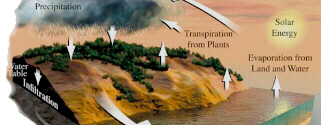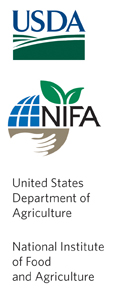Overview
The concept of watershed management relies on involvement from local stakeholders. Extension programs offered by Land Grant Universities in the region provide opportunities for agricultural producers and other interested parties in agriculturally-impacted communities to learn about their watershed, how their actions affect the watershed, and to adopt voluntary approaches for the improvement of water quality. In addition to educational programs, the Regional Water Quality Program provides a link between local stakeholders and state and federal agencies. This link can help facilitate cooperation and coordination among all levels of interest and regulation, and help to focus attention and limited resources on key issues.
Objectives
- Identify key watersheds in need of improvement plans, and assist in the development of those plans where appropriate.
- Provide information for making science-based decisions on watershed loadings and priority pollutants for the EPA's TMDL Program.
- Help individuals and other stakeholders understand their role in contributing to water quality.
Projects Funded
Undergraduate Education: Watershed-focused field studies in ecohydrology for arid rangeland management
M. Walker, L. Saito, A. Sparrow, and S. Swanson
This education program gave support to provide undergraduate students and high school teachers with balanced analytic and field skills in ecohydrology, applicable to arid rangeland conservation and restoration on a watershed scale.
Read More >>
CONTACT
Mark Walker
Phone: 775-784-1938
Fax: 775-784-4789
Email: mwalker@cabnr.unr.edu
Design and evaluation of precision vegetative buffer strips as sustainable conservation management practice to control non-point source pollution in Hawaiian watersheds
A. Fares, University of Hawaii at Manoa
C. Evensen, University of Hawaii at Manoa
C. Chan-Halbrendt, University of Hawaii at Manoa
A. El-Kadi, University of Hawaii at Manoa
This project aims to design Vegetated Buffer Strips as conservation practices to reduce non-point source pollution in two Hawaiian watersheds; Makaha watershed on the island of Oahu and Hanalei watershed on the island of Kauai.
Read More >>
CONTACT
A. Fares
Phone: 808-956-6361
Fax: 808-956-6539
Email: afares@hawaii.edu
Effects of Feral Pigs on Water Quality and Pathogen Transport in Forested Hawaiian Watersheds
Greg Bruland, University of Hawaii at Manoa
Chad Browning, University of Hawaii at Manoa
Carl Evensen, University of Hawaii at Manoa
In 2007, eight sites with paired fenced and unfenced runoff plots were established in the forested areas of the Manoa watershed to initiate a long-term study of the effects of feral pigs (Sus scrufa) on erosion, runoff, and water quality.
Read More >>
CONTACT
Greg Bruland
Phone: 808-956-8901
Fax: 808-956-6539
Email: bruland@hawaii.edu
Mapping Hawaii's 319 non-point source pollution projects
Luisa F. Castro, University of Hawaii at Manoa
Project Website: http://www2.ctahr.hawaii.edu/wq/nps319/nonpointsource.htm
CONTACT:
Luisa Castro
Phone: 808-878-1213 ext 27
Fax: 808-878-6804
Email: luisac@hawaii.edu
Regional Approaches to Water Protection from Nonpoint Sources of Microbial Contaminants
Mark Walker, University of Nevada
Bob Atwill, University of California at Davis
Kenneth Tate, University of California at Davis
Carl Evensen, University of Hawaii at Manoa
This one year project will involve participants and collaborators from three state universities (Nevada, California and Hawaii), one safe drinking water primacy agency (Nevada Bureau of Health Protection Services) and a public water suppliers group in the alpine Lake Tahoe area.
Read More >>
CONTACT
Mark Walker
Phone: 775-784-1938
Fax: 775-784-4789
Email: mwalker@cabnr.unr.edu
Development of a Spatial Decision Support System for Rangeland Watershed Management
D. Phillip Guertin, University of Arizona
The primary objective of this project is to develop a GIS-based integrated watershed-scale Spatial Decision Support System (SDSS) that will provide land managers with recommendations for Best Management Practices (BMPs) based on site specific conditions.
Read More >>
CONTACT
D.P. Guertin,
Phone: 520-621-1723
Fax: 520-621-8801
Email: phil@nexus.srnr.arizona.edu
Water Quality on California Rangelands
Randy A. Dahlgren, University of California at Davis
K.W. Tate, University of California at Davis
E.R. Atwill, University of California at Davis
B. Allen-Diaz, University of California at Davis
M.J. Singer, University of California at Davis
The overall objective of the proposed research is to understand how management practices affect water quality on California oak woodland-annual rangelands. Our first objective is to use a paired watershed design to determine the watershed scale effects of fire and grazing intensity on water quality, hydrology, nutrient cycling and plant community dynamics on oak woodland-annual rangelands.
Read More >>
Project Website: http://danr.ucop.edu/uccelr/uccelr.htm
CONTACT:
R.A. Dahlgren
Phone: 530-752-2814
Fax: 530-752-1552
Email: radahlgren@ucdavis.edu
Natural Attenuation of Crytosporidium Parvum During Transport in Watersheds
T. Harter, University of California at Davis
A.I. Pachman, University of California at Davis
E.R. Atwill, University of California at Davis
C.F. Brush, University of California at Davis
The overall objective of the proposed work is to understand the natural attenuation of viable Cryptosporidium parvum (C. parvum) during transport from agricultural source areas to surface water supplies.
Read More >>
CONTACT
T. Harter
Phone: 530-752-2709
Fax: 530-752-5262
Email: thharter@ucdavis.edu |



